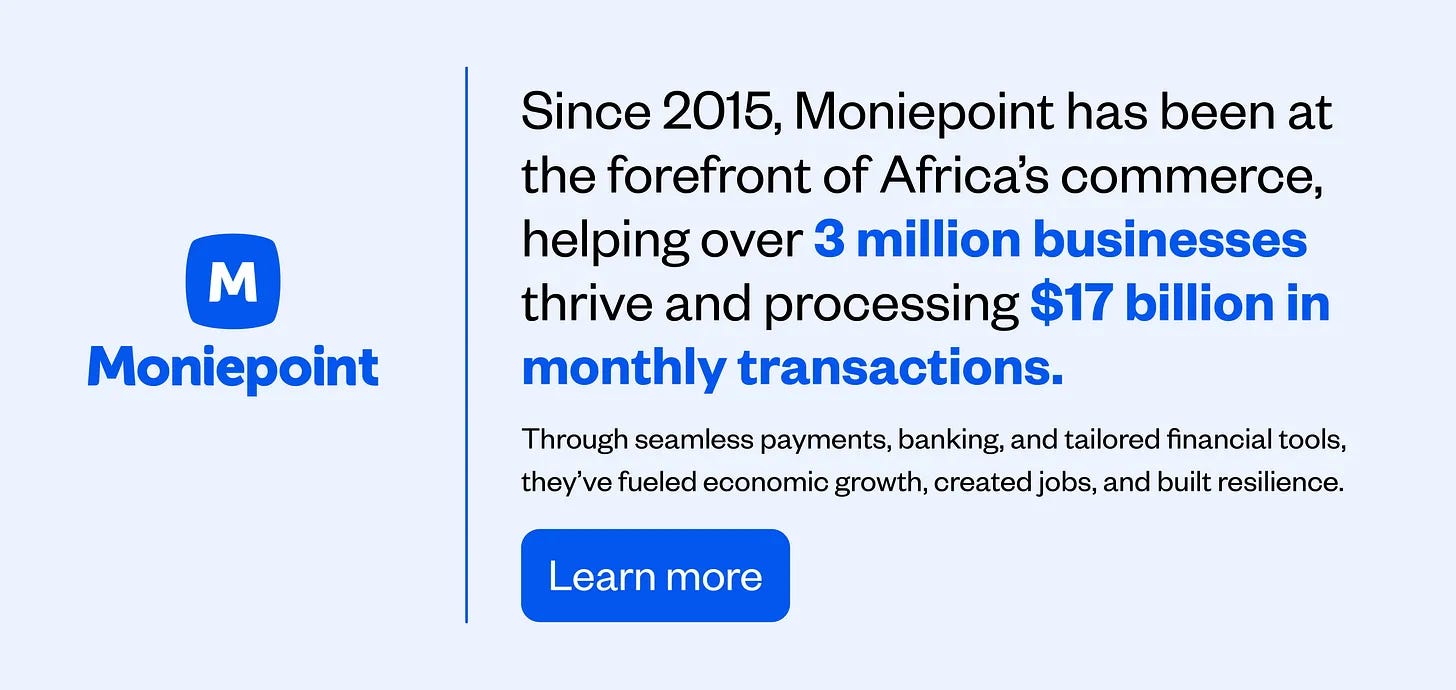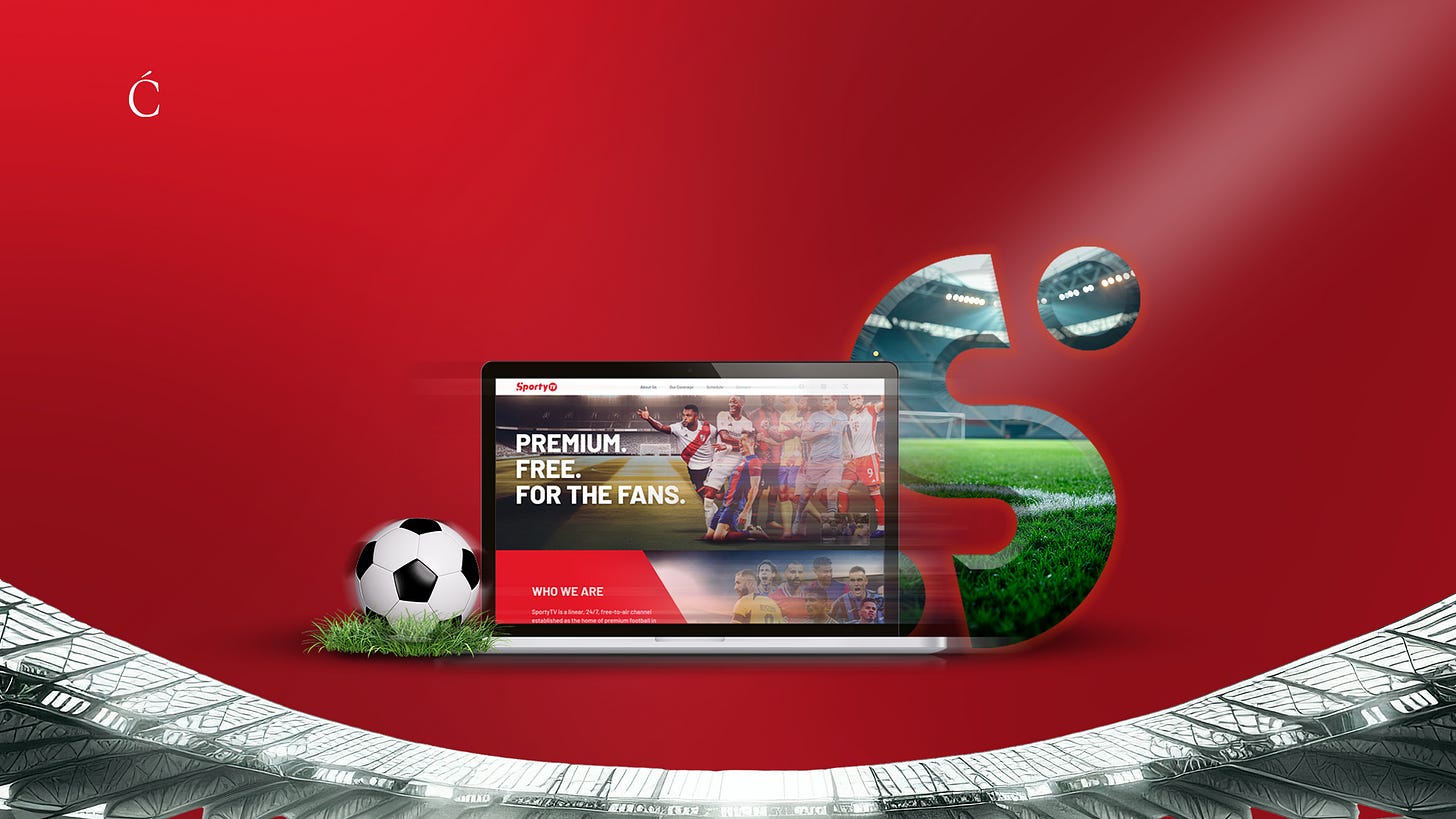Communiqué 79: Sporty TV wants to make live sports free for all Africans
Sporty TV is breaking down Africa’s sports paywalls, betting that free-to-air football, local voices, and mobile-first streaming can rewrite how millions watch the world’s biggest games.
Presented by Moniepoint
Key points.
Local Voices Matter: Audiences connect more deeply when content is produced and presented by people who understand their culture and context. Invest in local talent to build trust and loyalty.
Think Mobile-First: Sporty’s success shows that mobile is the gateway to scale in Africa. Distribution strategies should prioritise phones, not just traditional TV or desktop screens.
Pair Content with Smart Monetisation: Sporty TV uses free sports to drive ad revenue and cross-sell betting. Creative businesses should explore hybrid models that link free content to strong revenue streams.
1. A sporting spectacle
The 2025 Club World Cup final in New Jersey had just about everything football fans have come to expect from a major tournament final, and then some. On the pitch, Chelsea delivered the stuff of fairy tales, clinching a dramatic win as underdogs against PSG. After the match, a brief scuffle broke out, adding a touch of the chaos that football finals often serve up.
But other parts of the spectacle felt distinctly un-football-like. At halftime, thousands of fans in the MetLife Stadium and millions more watching worldwide were treated to a mini concert headlined by Tems, J Balvin, Doja Cat, Emmanuel Kelly, and Coldplay; more Super Bowl than World Cup. And when the medals were handed out, there was Donald Trump, grinning on the podium as Chelsea’s players lifted the gleaming trophy to ecstatic cheers from supportive fans and a chorus of boos from the president's detractors.
The tournament as a whole had been very different. In a bid to make the Club World Cup truly global—despite stiff opposition from some of football’s most powerful federations and leagues—FIFA had revamped the tournament into a quadrennial, 32-team showpiece with a staggering $1 billion prize pool. Africa, long starved of representation at the highest level of club football, now had four guaranteed slots in the expanded format.
Yet the most significant shift for the continent wasn’t on the pitch, but in how millions of Africans watched the tournament. By the final whistle, more than 17 million YouTube views had been logged for Sporty TV’s live coverage of the tournament. That figure was just a slice of the total audience. Across free-to-air channels and partner stations, Sporty TV had brought the competition into millions of more African homes for free.
Over the past three years, Sporty TV, a subsidiary of Sporty Group, the company behind SportyBet has quietly built a reputation as the continent’s new home of live sport. Its growing portfolio of free-to-air rights now spans some of the world’s biggest competitions, including the English Premier League, La Liga, Bundesliga, the Olympics, the Euros, and even the upstart Baller League.
In a region where access to premium sports has long been locked behind expensive paywalls, Sporty TV is betting that bringing top-tier action to anyone with a TV set or a mobile phone could be its most significant win yet.
2. Betting big on mobile.
Sudeep Ramnani was still a student at the London School of Economics when he attended a guest lecture about how quickly mobile phones were spreading across Africa. Sensing an opportunity to use this mobile revolution to drive financial inclusion, Ramnani launched I-Cash, a pin voucher system that let people pay for goods and services online by redeeming unique codes bought offline. I-Cash didn't take off, but his next venture would be a massive success.
In 2013, Ramnani launched SportyBet. The betting platform rode Africa’s mobile wave to massive success, thanks in part to a savvy deal with Transsion, the Chinese smartphone maker behind the Tecno, Infinix, and Itel brands. By getting the SportyBet app pre-installed on millions of Transsion smartphones, it put itself right in the pockets of Africa’s growing generation of mobile-first consumers. While there are no exact numbers of SportyBet users, PalmPay, the fintech venture Ramnani co-founded in 2019, would repeat the same playbook—reaching 30 million users within four years.
Building on the success of SportyBet, Sporty Group launched Sporty TV in 2022, signalling its ambition to become more than just a betting powerhouse. For Sudeep Ramnani, the move into media wasn’t entirely new territory. He had already dipped his toes in Africa’s digital broadcast industry as an early investor in Iroko TV. (He was also an investor in Paystack and Chowdeck.) But running a sports channel of his own had always been the real prize.
To bring the vision to life, Ramnani turned to Oluchi Enuha, Iroko TV’s former Head of Data and Analytics. In his time at Iroko, Enuha had played a pivotal role in some of the company’s key initiatives, including the launch of Iroko X, an early short-form video platform for African creators. This experience gave him a deep understanding of both the digital infrastructure and the audience dynamics needed to scale an African media venture.
3. Breaking Africa’s sports paywalls.
The current model for sports viewing in Africa is largely exclusionary. Take Nigeria, for example: MultiChoice, the continent’s dominant pay-TV operator, boasts around 7.5 million subscribers in the country. Yet surveys show that as much as 67% of Nigerians, (over 120 million people) want to watch live football matches. The gap between desire and access is stark, and it’s driven by one thing: the steep cost of satellite subscriptions. For many families, premium sports packages are simply unaffordable luxuries.
This paywall problem is the reality in most African markets, where live sports rights have long been locked away behind expensive decoders and monthly fees. This leaves millions of die-hard fans resorting to illegal and unreliable streams, overcrowded viewing centres, or missing out entirely. To fix that, Sporty TV focused on free-to-air rights, which had been largely underutilised on the continent.
To launch, Sporty TV picked Nigeria as its first market. These decision came with its own challenges. Decades earlier, in the wake of the Nigerian Civil War and the propaganda threat posed by Biafra Radio during the war, the Nigerian government, through the National Broadcasting Commission (NBC), had imposed strict limits on how far private and regional stations could broadcast. Under this system, only the federal government retained the right to operate truly nationwide broadcast stations over the country’s analog terrestrial network.
In 2006, Nigeria signed on to the International Telecommunication Union’s global mandate to migrate from analog to digital terrestrial broadcasting a move meant to expand access, free up spectrum, and modernise the broadcast sector, creating the opportunity for a truly nationwide broadcast station. But the transition did not begin until 2015 when a government white paper laid out a phased implementation plan.
While the digital switch-over looked promising on paper, in practice it stalled badly, bogged down by bureaucracy and missed deadlines. By 2023, despite spending over $500 million on the project, only 8 out of Nigeria’s 36 states had partial digital coverage; the rest of the country remained stuck on analog, meaning true nationwide reach was only possible through satellite, an expensive route that clashed with Sporty TV’s free-to-air promise.
Sporty TV found a workaround. To stay free and accessible, it struck a strategic partnership with the Nigerian Television Authority (NTA), the national broadcaster with a sprawling network of over 100 stations that collectively cover the entire country.
Sporty TV launched in Nigeria with the English Premier League. But Sporty TV didn’t stop at showing the games free of charge—it invested heavily in local production too. Instead of simply rebroadcasting foreign feeds, Sporty TV ensures that commentary and match analysis are done by African voices who understand the audience and local context.
“It is important to us that a match be locally produced. We take these matches and present them to our people in an African way. That familiarity should be there at all times,” Enuha said to Communiqué. “As we evolve, we would give more opportunity to our audience to be part of the conversation. The same way that when I'm in Europe and I'm watching Sky Sports, I see they have more and more audience interaction between presenters, pundits, and fans.”
This local-first approach has become a hallmark of the channel’s strategy, even as it expands across Africa. Since 2022, Sporty TV has launched in three more countries. In 2023, the channel went live in Ghana, tapping respected sports journalist and former Head of Sports at Ghana’s Multimedia Group to lead Sporty Ghana’s content operations.
This year, Sporty TV went live in South Africa and Kenya. In Kenya, Sporty even doubled down, launching Sporty FM, the country’s first 24/7 English-language sports radio station.
Meanwhile, the channel’s content arsenal keeps growing. Beyond the Premier League, Sporty TV has secured free-to-air rights for the Bundesliga, Serie A, La Liga, the Saudi Pro League, the Carabao Cup, the Olympics, and the just concluded FIFA Club World Cup, where it broadcast 24 of the tournament’s available 63 matches live across YouTube, its website, and partner stations.
4. The African sports rights opportunity.
Globally, the ways in which the world watches sport have been shifting fast. Streaming giants have realised that live sports is the crown jewel for retaining subscribers, and they’re paying handsomely for it. This arms race has driven the global market for sports rights to a projected $64 billion by 2026, up from $51 billion in 2019.
In 2018, Amazon Prime grabbed headlines when it secured the rights to stream 20 Premier League matches per season for three years at around £30 million per season. By 2022, Apple TV+ got in on the live sports game, clinching a 10-season, $250 million-per-year deal to stream Major League Soccer. YouTube, too, is now a major player, securing NFL Sunday Ticket games for an eye-watering $2.5 billion per season for seven seasons, and the big streamers are already preparing for the inevitable bidding war when FIFA’s World Cup rights come up again.
Yet amid this global scramble, Africa’s sports rights have remained largely on the sidelines. During the 2021 African Cup of Nations, some matches were streamed on YouTube on the Confederation of African Football (CAF) channel with no publicly disclosed rights deal between the platform and CAF, potentially leaving millions of dollars on the table.
Now Sporty TV has embraced YouTube as a core part of its distribution strategy, and the focus is on driving accessibility while the potential revenue from the continent’s sports properties comes second.
“We had over 17 million views across four countries in Africa. That is 17 million views that may have never existed because people couldn't afford to pay.” Enuha said to Communiqué
For Sporty TV, the revenue model leans on advertising and, crucially, serves as a powerful marketing funnel for SportyBet. During the Club World Cup broadcasts, match commentators didn’t just analyse the play they also dropped live betting odds at intervals, seamlessly weaving SportyBet into the viewing experience.
But for Sporty TV, it’s about access. By putting top-tier football on free-to-air TV, mobile, and YouTube, it is testing whether a continent that has long been locked out of premium sport can finally have a seat in the front row. For Sporty TV—and the millions who tune in—that might be the biggest win of all.




